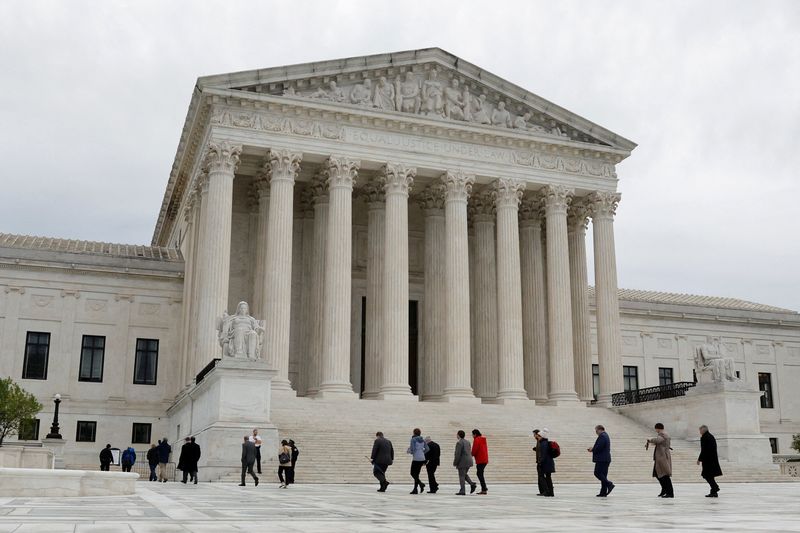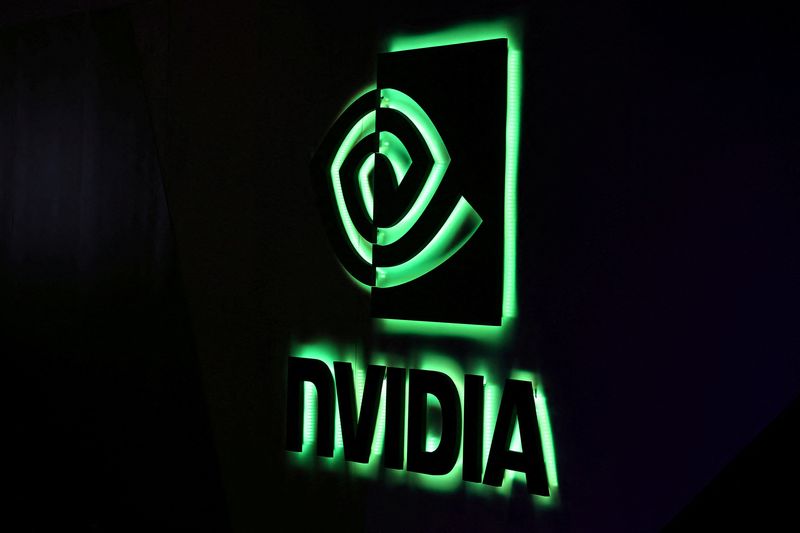By John Kruzel, Andrew Chung
WASHINGTON (Reuters) -The U.S. Supreme Court scrutinized on Wednesday Nvidia (NASDAQ:NVDA)'s bid to torpedo a securities fraud lawsuit accusing the artificial intelligence chipmaker of misleading investors about how much of its sales depended on the volatile cryptocurrency market.
The justices heard arguments in Nvidia's appeal of a lower court's decision allowing a 2018 class action - litigation led by the Stockholm, Sweden-based investment management firm E. Ohman J:or Fonder AB - to proceed.
It is one of two cases heard by the Supreme Court this month that could lead to rulings making it harder for private litigants to hold companies to account for alleged securities fraud. The other one, involving Meta's Facebook (NASDAQ:META), was argued on Nov. 6.
At issue in the Nvidia case is whether the plaintiffs cleared the heightened legal bar for bringing private securities fraud suits set under a 1995 federal law called the Private Securities Litigation Reform Act that aimed to screen out frivolous litigation.
Some of the justices expressed reservations about intervening in the case. They wondered about whether there is a clear legal issue for them to decide, as opposed to just a dispute over facts, and indicated that they may not be ideally placed to resolve the case given its technical complexities.
"It just seems to me that you're asking us to engage in a kind of analysis that we are not very good at and weren't expecting when we took this case," liberal Justice Elena Kagan told Neal Katyal, the lawyer arguing for Nvidia.
Liberal Justice Ketanji Brown Jackson questioned whether the standard that Nvidia has asked the court to adopt would place too heavy a burden on plaintiffs.
"I guess my concern is that you appear to be requiring for plaintiffs to actually have the evidence in order to plead their case," Jackson said, noting that critical evidence often is not obtained by plaintiffs until a later stage of litigation.
The plaintiffs accused Nvidia and its CEO Jensen Huang of violating a 1934 federal law called the Securities Exchange Act by making statements in 2017 and 2018 that falsely downplayed how much of Nvidia's revenue growth came from crypto-related purchases.
Conservative Chief Justice John Roberts appeared to search for a middle ground.
"If I think that the positions on both sides are a little too absolute, how do you find sort of the sweet spot in terms of when the (Private Securities Litigation Reform Act) is satisfied?" Roberts asked Katyal.
The higher legal standards under the law mean that plaintiffs need more than "just a little bit of direct evidence," Roberts said. "On the other hand, it seems to me you can't insist on only the direct evidence before a complaint goes forward. So if I don't think it's black and white, how ... do I decide where the balance is?"
Beginning in 2017, as the price of certain cryptocurrencies rose, Nvidia's chips became increasingly popular for cryptomining, a process that involves performing complex math equations in order to secure cryptocurrencies such as bitcoin and ether.
By late 2018, amid a decline in crypto profitability, Nvidia's revenue fell short of its projections, leading its stock price to fall in early November of that year.
The plaintiffs accused Nvidia and its top officials of concealing the impact of cryptomining on its business. The suit seeks unspecified monetary damages in part to recoup the lost value of the Nvidia stock held by the investors.
Nvidia in 2022 agreed to pay $5.5 million to U.S. authorities to settle charges that it did not properly disclose the impact of cryptomining on its gaming business, but without admitting or denying the findings of federal regulators.
'INACCURATE CHARACTERIZATION'
Conservative Justice Neil Gorsuch asked Deepak Gupta, the lawyer representing the plaintiffs, to respond to Nvidia's argument that their allegations about how much of the company's sales went to crypto miners relied heavily on an expert opinion by the economic consulting firm, Prysm Group, that contained too few details to clear the initial phase of litigation.
Gupta called Nvidia's claim "an inaccurate characterization of the report."
"Basically what Prysm was doing was math," Gupta said. "It was taking publicly available figures and doing some multiplication."
"Expensive math, I have to guess," Gorsuch said, prompting laughter in the courtroom.
A federal judge dismissed the lawsuit but the San Francisco-based 9th U.S. Circuit Court of Appeals subsequently revived it.
Conservative Justice Brett Kavanaugh raised a concern expressed to the Supreme Court by outside interest groups that the 9th Circuit decision created "a blueprint" for getting around the heightened legal bar set by Congress in the Private Securities Litigation Reform Act.

President Joe Biden's administration supported the shareholders in the case.
The Supreme Court's rulings in the Facebook and Nvidia cases are expected by the end of June.
